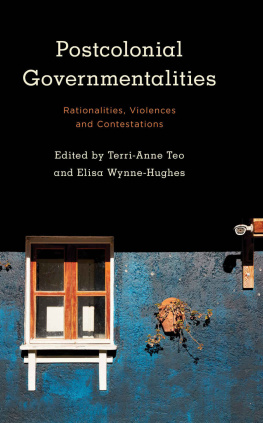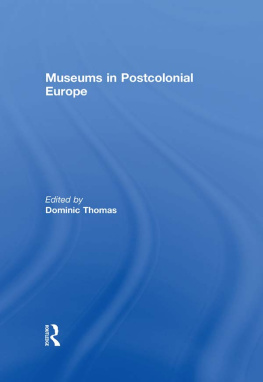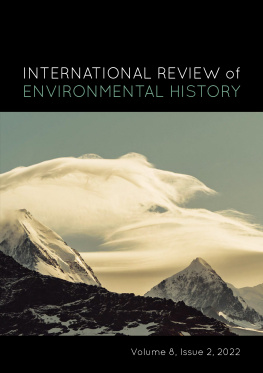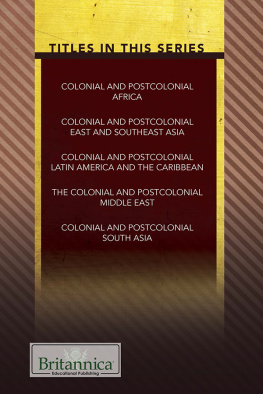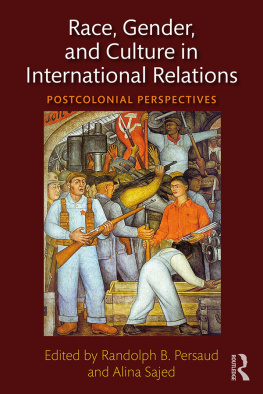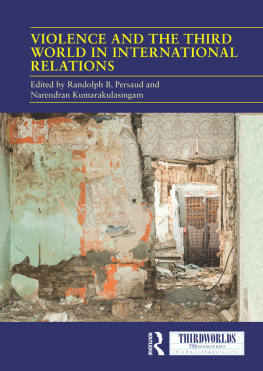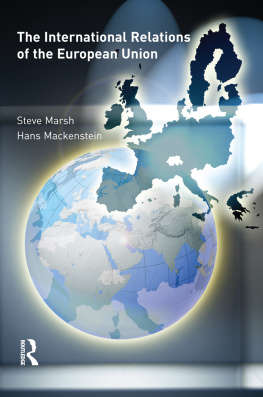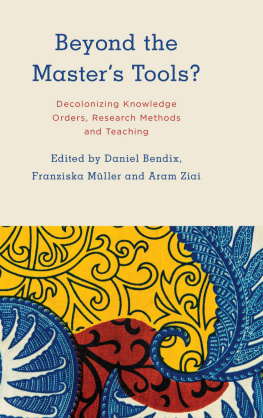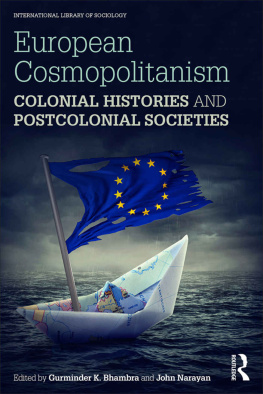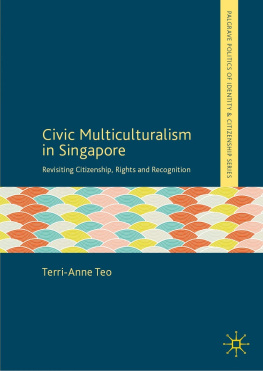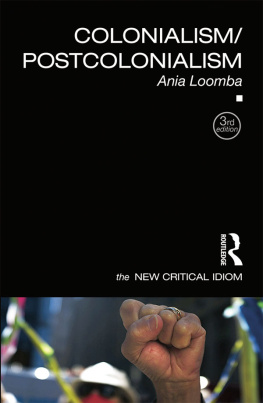Edited by Terri-Anne Teo - Postcolonial Governmentalities (Kilombo: International Relations and Colonial Questions)
Here you can read online Edited by Terri-Anne Teo - Postcolonial Governmentalities (Kilombo: International Relations and Colonial Questions) full text of the book (entire story) in english for free. Download pdf and epub, get meaning, cover and reviews about this ebook. year: 2020, publisher: Rowman & Littlefield Publishers, genre: Politics. Description of the work, (preface) as well as reviews are available. Best literature library LitArk.com created for fans of good reading and offers a wide selection of genres:
Romance novel
Science fiction
Adventure
Detective
Science
History
Home and family
Prose
Art
Politics
Computer
Non-fiction
Religion
Business
Children
Humor
Choose a favorite category and find really read worthwhile books. Enjoy immersion in the world of imagination, feel the emotions of the characters or learn something new for yourself, make an fascinating discovery.
- Book:Postcolonial Governmentalities (Kilombo: International Relations and Colonial Questions)
- Author:
- Publisher:Rowman & Littlefield Publishers
- Genre:
- Year:2020
- Rating:3 / 5
- Favourites:Add to favourites
- Your mark:
- 60
- 1
- 2
- 3
- 4
- 5
Postcolonial Governmentalities (Kilombo: International Relations and Colonial Questions): summary, description and annotation
We offer to read an annotation, description, summary or preface (depends on what the author of the book "Postcolonial Governmentalities (Kilombo: International Relations and Colonial Questions)" wrote himself). If you haven't found the necessary information about the book — write in the comments, we will try to find it.
Postcolonial Governmentalities (Kilombo: International Relations and Colonial Questions) — read online for free the complete book (whole text) full work
Below is the text of the book, divided by pages. System saving the place of the last page read, allows you to conveniently read the book "Postcolonial Governmentalities (Kilombo: International Relations and Colonial Questions)" online for free, without having to search again every time where you left off. Put a bookmark, and you can go to the page where you finished reading at any time.
Font size:
Interval:
Bookmark:
Postcolonial Governmentalities
Kilombo: International Relations and
Colonial Questions
This is the first series to mark out a dedicated space for advanced critical inquiry into colonial questions across International Relations. The ethos of this book series is reflected by the bricolage constituency of Kilombos settlements of African slaves, rebels and indigenous peoples in South America who became self-determining political communities that retrieved and renovated the social practices of its diverse constituencies while being confronted by colonial forces. The series embraces a multitude of methods and approaches, theoretical and empirical scholarship, alongside historical and contemporary concerns. Publishing innovative and top-quality peer-reviewed scholarship, Kilombo enquires into the shifting principles of colonial rule that inform global governance and investigates the contestation of these principles by diverse peoples across the globe. It critically re-interprets popular concepts, narratives and approaches in the field of IR by reference to the colonial question and, in doing so, the book series opens up new vistas from which to address the key political questions of our time.
Series Editors:
Mustapha K. Pasha, Aberystwyth University
Meera Sabaratnam, SOAS University of London
Robbie Shilliam, Queen Mary University of London
Titles in the Series
Meanings of Bandung: Postcolonial Orders and Decolonial Visions, Edited by Qunh N. Phm and Robbie Shilliam
Politics of the African Anticolonial Archive, Edited by Shiera S. el-Malik and Isaac A. Kamola
Asylum after Empire: Colonial Legacies in the Politics of Asylum Seeking, Lucy Mayblin
Decolonizing Intervention: International Statebuilding in Mozambique, Meera Sabaratnam
Global Development and Colonial Power: German Development Policy at Home and Abroad, Daniel Bendix
The Postcolonial African State in Transition: Stateness and Modes of Sovereignty, Amy Niang
South Africa, Race and the Making of International Relations, Vineet Thakur and Peter Vale
Postcolonial Governmentalities: Rationalities, Violences and Contestations, Edited by Terri-Anne Teo and Elisa Wynne-Hughes
Postcolonial Governmentalities
Rationalities, Violences and Contestations
Edited by Terri-Anne Teo and
Elisa Wynne-Hughes

London New York
Published by Rowman & Littlefield International, Ltd.
6 Tinworth Street, London SE11 5AL, United Kingdom
www.rowmaninternational.com
Rowman & Littlefield International, Ltd. is an affiliate of
Rowman & Littlefield
4501 Forbes Boulevard, Suite 200, Lanham, Maryland 20706, USA
With additional offices in Boulder, New York, Toronto (Canada), and London (UK)
www.rowman.com
Selection and editorial matter 2020 by Terri-Anne Teo and Elisa Wynne-Hughes
Copyright in individual chapters is held by the respective chapter authors.
All rights reserved. No part of this book may be reproduced in any form or by any electronic or mechanical means, including information storage and retrieval systems, without written permission from the publisher, except by a reviewer who may quote passages in a review.
British Library Cataloguing in Publication Information
A catalogue record for this book is available from the British Library
ISBN: HB 978-1-78660-682-2
ISBN: PB 978-1-78660-683-9
Library of Congress Cataloging-in-Publication Data
Names: Teo, Terri-Anne, editor. | Wynne-Hughes, Elisa, 1982- editor.
Title: Postcolonial governmentalities : rationalities, violences and contestations / Edited by Terri-Anne Teo and Elisa Wynne-Hughes.
Description: London ; New York : Rowman & Littlefield International, [2020] | Series: Kilombo: international relations and colonial questions | Includes bibliographical references and index. | Summary: "This collection provides an analytical approach that combines postcolonial thought and governmentality to understand power, identity, inequality and insecurity"-- Provided by publisher.
Identifiers: LCCN 2019052761 (print) | LCCN 2019052762 (ebook) | ISBN 9781786606822 (cloth) | ISBN 9781786606839 (paperback) | ISBN 9781786606846 (epub)
Subjects: LCSH: Postcolonialism. | World politics. | Political science.
Classification: LCC JV51 .P65145 2020 (print) | LCC JV51 (ebook) | DDC 325/.3--dc23
LC record available at https://lccn.loc.gov/2019052761
LC ebook record available at https://lccn.loc.gov/2019052762
 TM The paper used in this publication meets the minimum requirements of American National Standard for Information Sciences Permanence of Paper for Printed Library Materials, ANSI/NISO Z39.48-1992.
TM The paper used in this publication meets the minimum requirements of American National Standard for Information Sciences Permanence of Paper for Printed Library Materials, ANSI/NISO Z39.48-1992.
Postcolonial Governmentalities developed from papers and discussions that took place at three workshops: the Postcolonial Governmentality Workshop in September 2014 (organised by Terri-Anne Teo and Elisa Wynne-Hughes, hosted by Bristol University and funded by Cardiff Universitys Department of Politics and IR, as well as the College of Arts, Humanities and Social Sciences and the University of Bristols Alumni Foundation and the Gender Research Centre and Global Insecurities Centre); the Spatial Practices of Postcolonial Governance: Inequalities, Exclusions and Potentials Workshop in September 2015 (organised by Terri-Anne Teo and Elisa Wynne-Hughes, hosted by Cardiff University and funded by Cardiff School of Law and Politics, as well as the Poststructural Politics, Colonial/Postcolonial/Decolonial and Africa Working groups of the British International Studies Association [BISA]); and the Freedom and Constraint: Colonial Subjectivities, Postcolonial Governmentalities Workshop in June 2017 (organised by Simon Philpott and Elisa Wynne-Hughes, and hosted by the European Workshops in International Studies at Cardiff University, partly funded by the Poststructural Politics Working Group of BISA). We would like to thank the series editors, workshop participants and each of the contributing authors for their commitment to this project. In getting this book to publication, we would like to thank Rebecca Anastasi and Dhara Snowden. We would also like to thank our partners, Matt ODonnell and Ric Auty, for their patience during the completion of this volume, and to Annika, Miso and Babka for providing many moments of joy throughout this process.
Terri-Anne Teo and Elisa Wynne-Hughes
Postcolonial Governmentalities
There has been an intimate connection between postcolonialism and Foucauldian scholarship from the outset, insofar as leading postcolonial theorists have drawn on, extended and critiqued his work. These studies demonstrate the relevance of both postcolonialism and governmentality to a diversity of fields, and in both the West and non-West. This volume draws out how the relationship between these approaches is relevant to critical International Relations (IR).
Based on the contributions of studies and historical entanglement between these two approaches, this volume introduces what we call a postcolonial governmentalities approach, which draws together elements of postcolonialism on the one hand and Foucauldian governmentality on the other. This approach recognises the strengths of governmentalitys analytical tools, while accounting for the historical and contemporary colonial practices that shape various forms of governance. Existing postcolonial scholarship largely critiques the gaps in Foucauldian governmentality approaches. For instance, Stephen Legg argues that whilst Michel Foucault has provided many of the tools that are necessary to unpick the power-knowledge relationships of post-Enlightenment Europe, especially in their spatial groundedness, his silence on the colonial construction of European modernity and the mutual constitution of metropole and periphery is astounding. Nonetheless, in critiquing governmentality, these scholars do not entirely reject, and indeed rely on, many of its analytical tools. As such, their critiques demonstrate how it is necessary to take a recalibrated approach to understand how postcolonial spaces and discourses affect the emergence and contestations of governmentalities in the non-West, which are not merely copies of the West but take shape in contextually specific ways. While critiquing the Eurocentrism of governmentality, postcolonialism draws on it to uncover alternative technologies, agents and manifestations of governance. Postcolonialism allows us to unpack how governmentalities function in both the West and non-West, recognising how colonial discourses shape both contexts while also shedding light on particular histories of colonialism that contour how political rationalities, violences and contestations manifest in the non-West.
Font size:
Interval:
Bookmark:
Similar books «Postcolonial Governmentalities (Kilombo: International Relations and Colonial Questions)»
Look at similar books to Postcolonial Governmentalities (Kilombo: International Relations and Colonial Questions). We have selected literature similar in name and meaning in the hope of providing readers with more options to find new, interesting, not yet read works.
Discussion, reviews of the book Postcolonial Governmentalities (Kilombo: International Relations and Colonial Questions) and just readers' own opinions. Leave your comments, write what you think about the work, its meaning or the main characters. Specify what exactly you liked and what you didn't like, and why you think so.

